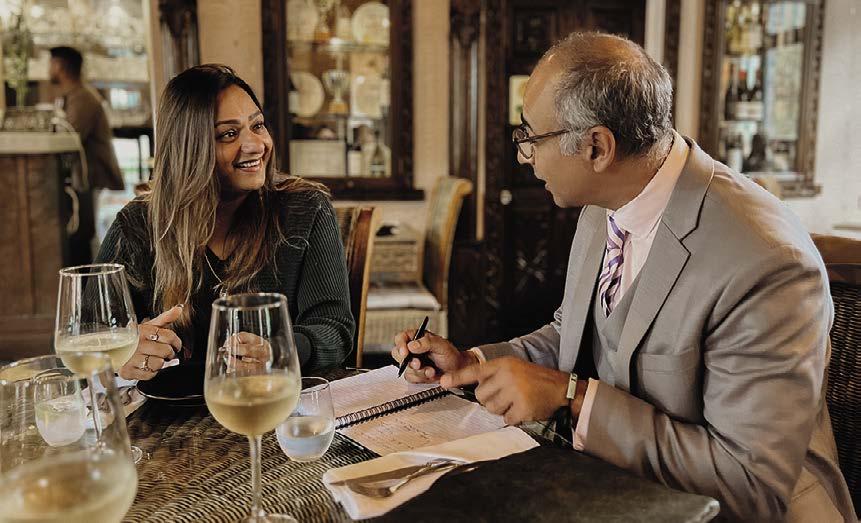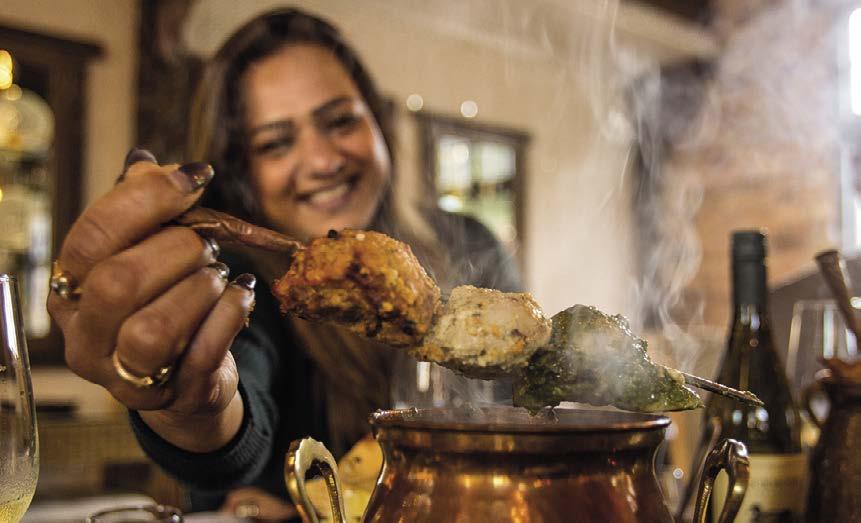
2 minute read
PUNEET DHALL: MEETING DIMPLE AT IVILLAGE IN VICTORIA PARK MARKET
To me there is no one more progressive or intoxicating than a fearless woman who knows her mind.
I am sitting with Dimple Girish, who together with her son, Smeet, owns the fine dining establishment ‘iVillage’ in Victoria Park Market. Dimple points to the grand red brick chimney towering above us, an icon of Auckland: “One of the reasons we chose this site was the beautiful heritage associated with this space. The buildings are 110 years old.” Clearly, tradition, heritage and culture mean much to Dimple, but she is certainly not backward looking.
Her cuisine is not only delicious but pays fastidious attention to health and sustainability. Dimple proudly states, “No food colouring, no cream, no sugar.” The charcoal tandoor stands proudly in the corner, and if there is something that I worship it is the tandoor. These clay ovens heat the air to 350°C. The marinated and oiled food within, crackling and sizzling on the outside with smoked and grilled flavours, whilst remaining incalculably succulent within.
Dimple’s flagship dish, ‘The tandoori trio’, three mouth watering pieces of boneless chicken marinated three ways in three colours, green – spinach, coriander and mint marinade, red – saffron, and white – cream cheese, are presented on a small skewer inside a smokingcopper pot. So many wines could pair with this trio. I opt for the 2021 Duckhorn chardonnay from Napa Valley, California. A lees and creamy texture, good energy, broad mouthfeel, hints of fennel and star anise on the nose. Job done!
Dimple is full of energy and an outstanding chef. Born in Ahmedabad in Gujarat, she learnt to cook with her mother in the traditional ways in their Indian kitchen at home with a coalfired hearth. Dimple gives a nod to this tradition by housing an old Indian ox cart in the courtyard of her restaurant. The cart is 180 years old and represents the beating heart of Mother India for several hundred years. It brings back images for me too. Margaret Bourke White was a fearless American woman and one of the greatest photographers of the 20th Century. Between the 1930s and 1950s she would travel independently to far-flung regions around the world, often in conflict, and capture their essence with her photographs.

In 1947, India was a divided country. The British had left ignominiously, and in their wake created a sectarian divide of such immense proportions that mass genocide followed. What had been tolerant and unified regions of multiple religions along the North West territories of India, were, overnight, ripped apart as millions of Muslims now fled from India into newly created Pakistan and similar numbers of Hindus, Sikhs, Buddhists and more, fled from Pakistan into India. Bourke White bravely and beautifully captured images of these fleeing refugees carrying whatever they could from their hastily departed villages and homes. Lines many kilometres long of people travelling on ox carts looking forlorn, facing violence, looting, death and disease on their perilous journey.
Bourke White was fearless in her determination to capture the stories of ordinary people involuntarily caught up in such diabolical circumstances. And this courage, joie de vivre and fearlessness belongs to Dimple also. She tells me that after Covid she would often give free food to people in need around Ponsonby. Times were tough for some at that stage. She explains that her husband offered some kind advice. He told Dimple that this was a business and as such the business could not afford to keep feeding these people in need.
Dimple asked her husband, “Do you want me to change?” He replied, “Yes.” Dimple retorted, “Well, if you want me to change, then if that were the case the first thing I would change is you!” The husband backed down and Dimple carried on feeding those in need. You see, ‘being human’ is what being human is all about. (PUNEET DHALL) PN
@puneetofponsonby
@dhallandnash










